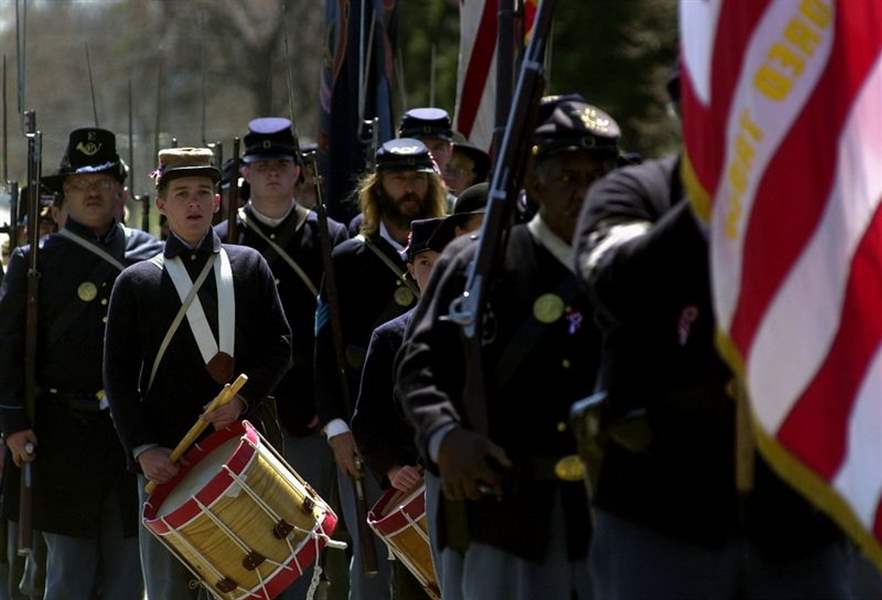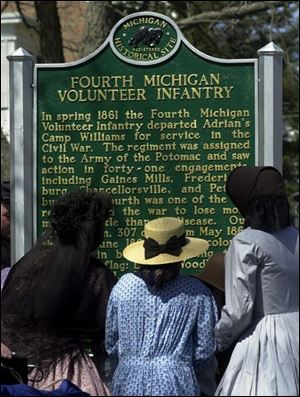
Adrian marks its connection to Civil War
4/14/2003
A Civil War re-enactment group representing the 4th Michigan Infantry Regiment stands at attention during the ceremony at Madison and Williams streets in Adrian.
lisa dutton / blade

A Civil War re-enactment group representing the 4th Michigan Infantry Regiment stands at attention during the ceremony at Madison and Williams streets in Adrian.
ADRIAN — For several weeks A.J. Handy and Stacey Allen have been a part of a group of local residents who gather every Sunday to show support for U.S. troops overseas.
Yesterday they gave their support to a different group of soldiers: those who served their country more than a century ago.
The pair stood behind the uniformed members of the 4th Michigan Infantry Regiment re-enactment group and listened to tales of how men from all over the area gathered on the grounds of Adrian College. The year was 1861, and the men came together to train for a role in the American Civil War.
Yesterday more than 100 people gathered at Madison and Williams streets to watch the unveiling of a state historical marker. Positioned in front of Adrian College's North Hall, the marker told the story of the 1,025 who came to train at the college at the outbreak of the war.
“We support our troops today, [and] we need to know that they supported their troops back then too,” said Mr. Handy, 22, who was at a support-the-troops rally recently when he learned or the ceremony. “This has been a long time coming. It needed to happen.”
Butch Miller is a member of the re-enactment group, which has spent the past couple of years raising funds to secure a historical marker.

A state historical marker has long been a dream of Adrian-area residents to commemorate the area's role in the Civil War.
Yesterday, dressed in full Civil War regalia, Mr. Miller said that there are only a couple of other Michigan spots where markers have been placed to recognize training sites. The reason for that, he said, was that most sites were lost to development. But in Adrian the college campus will remain a static location, he said.
“At the 50th reunion of the 4th Michigan in 1911, the mayor of Adrian at the time made a speech saying he would like to one day see a marker put up,” he said. “We feel we are finishing what others started back then.”
The story of the 4th Infantry began in Adrian, where men from throughout the region reported for training. At first, the soldiers were slated to train at the Lenawee County Fairgrounds, but a wet and cold spring made the area undesirable.
The trustees of Adrian College offered the trainees use of the campus buildings and grounds, which then became known as Camp Williams. Although the original building has since been replaced, North Hall, where the officers likely stayed, remains on the corner of Williams and Madison streets.
The 4th Michigan Infantry was known as a fierce fighting unit, Mr. Miller said. It fought with the Union Army of the Potomac and participated in the Battle of Gettysburg, among other actions. At a time when about two-thirds of all casualties were caused by disease, the 4th Michigan lost most of its men to battle.
According to local historians, 30,000 people from throughout the region came to Adrian June 21 of that year to see the men depart for war. Jeff Phelps' relative was among them.
Mr. Phelps, who traveled from Michigan's Upper Peninsula to be a part of yesterday's ceremony, said his great-grandfather's brother fought and died as a member of the 4th Michigan.
Charles W. Phelps was 15 when he enlisted, though his records list him as being 18. Three years later he was killed in battle.
Mr. Phelps clutched a binder full of letters that the young soldier sent to his brother, Mr. Phelps' great-grandfather. As he leafed through them, he talked of the history he has learned about the young soldier and how he paid the ultimate price.
“I thought I could honor him by being here,” he said.